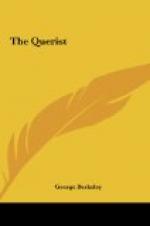204. Qu. Whether a bank of national credit, supported by public funds and secured by Parliament, be a chimera or impossible thing? And if not, what would follow from the supposal of such a bank?
205. Qu. Whether the currency of a credit so well secured would not be of great advantage to our trade and manufactures?
206. Qu. Whether the notes of such public bank would not have a more general circulation than those of private banks, as being less subject to frauds and hazards?
207. Qu. Whether it be not agreed that paper hath in many respects the advantage above coin, as being of more dispatch in payments, more easily transferred, preserved, and recovered when lost?
208. Qu. Whether, besides these advantages, there be not an evident necessity for circulating credit by paper, from the defect of coin in this kingdom?
209. Qu. Whether the public may not as well save the interest which it now pays?
210. Qu. What would happen if two of our banks should break at once? And whether it be wise to neglect providing against an event which experience hath shewn us not to be impossible?
211. Qu. Whether such an accident would not particularly affect the bankers? And therefore whether a national bank would not be a security even to private bankers?
212. Qu. Whether we may not easily avoid the inconveniencies attending the paper-money of New England, which were incurred by their issuing too great a quantity of notes, by their having no silver in bank to exchange for notes, by their not insisting upon repayment of the loans at the time prefixed, and especially by their want of manufactures to answer their imports from Europe?
213. Qu. Whether a combination of bankers might not do wonders, and whether bankers know their own strength?
214. Qu. Whether a bank in private hands might not even overturn a government? and whether this was not the case of the Bank of St. George in Genoa? [Footnote: See the Vindication and Advancement of our national Constitution and Credit. Printed in London 1710.]
215. Qu. Whether we may not easily prevent the ill effects of such a bank as Mr Law proposed for Scotland, which was faulty in not limiting the quantum of bills, and permitting all persons to take out what bills they pleased, upon the mortgage of lands, whence by a glut of paper, the prices of things must rise? Whence also the fortunes of men must increase in denomination, though not in value; whence pride, idleness, and beggary?
216. Qu. Whether such banks as those of England and Scotland might not be attended with great inconveniences, as lodging too much power in the hands of private men, and giving handle for monopolies, stock-jobbing, and destructive schemes?
217. Qu. Whether the national bank, projected by an anonymous writer in the latter end of Queen Anne’s reign, might not on the other hand be attended with as great inconveniencies by lodging too much power in the Government?




